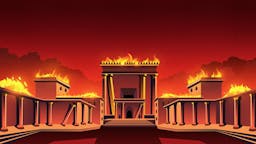Tisha B'Av & The Spies
How Can the Story of the Spies in Numbers Unlock the True Meaning of Tisha B’Av?
By Danielle Fisher | 15 June 2024 | 5 Minute Read

Looking for more?
We have hours of delightful videos and podcasts to enhance your Yamim Noraim experience.
The 9th of Av: What Are We Really Mourning?
While we commemorate all sorts of Jewish tragedies on Tisha B’Av, our mourning really stems from one major tragedy: the destruction of the First and Second Temples in Jerusalem. But the Talmudic Sages mention another catastrophe that occurred on the 9th of Av, centuries prior to the destruction of the Temples—the sin of the 12 spies. The Sages seem to suggest that this sin, recorded in the Book of Numbers, is somehow a source of our later suffering. What does the mysterious event of the spies have to do with the destruction of the Temples, and how can it help us unlock the transformative power of Tisha B’Av?
The Sin of the Spies
We’re in the midst of the Book of Numbers, Sefer Bamidbar. The Israelites are wandering the desert after their miraculous redemption from Egypt. They’re about to reach their final destination, the Promised Land. But before they enter the land of Israel, Moses sends leaders of the 12 tribes to scout out the land. The spies spend 40 days surveying the land, inspecting its inhabitants, testing its fruit.
On the ninth day of the month of Av, the spies return to the Israelites with their report. They describe how the land flows with milk and honey. They show Moses and the people the huge, juicy fruit of the land. But that’s where the praises end. Next, the spies go into a tirade about all the negatives of the land. The people who inhabit the land are mighty giants! The cities are well fortified—it will be impossible to conquer. Immediately, the entire nation devolves into a flurry of fear and grief. They rebel against Moses, begging to return to Egypt and threatening to elect a new leader. The situation is bad—so bad that the aftereffects reverberate for generations.
The Sages explain, “That night [that the spies brought back their report] was the night of the Ninth of Av. The Holy One, Blessed be He, said to them: You wept needlessly that night, and I will therefore establish for you a true tragedy over which there will be weeping in future generations” (Taanit 29a 2-7).
The Talmudic text seems to be suggesting that the spies’ negative report and the Israelites’ mournful reaction to it is the reason that hundreds of years later on that very same day, the Temples were destroyed, and countless other calamities occurred. Sure, the spies’ report and the people’s reaction definitely betrayed a lack of faith. But doesn’t such a punishment seem like an overreaction? What was so evil about the spies’ report that centuries later, Jerusalem was razed and G-d’s abode in the world destroyed on account of it? What is the hidden connection between these two seemingly distinct tragedies?
What Exactly Did the Spies Do Wrong?
Okay, so the spies didn’t exactly speak favorably about the land. And the Israelites’ certainly did not have the reaction Moses may have hoped for. But did the spies actually do anything wrong? After all, Moses instructed the spies to evaluate “what kind of land it is, and the people who inhabit it. Are they strong or weak? Are there few or many? And what of the land that they’re dwelling in? Is it good or bad? And what of the cities in which they reside?...What is the soil like? Is it rich or poor?” (Numbers 13: 19-20). Moses never requests that the spies only bring back positive reports; he’s requesting a balanced report.
And, in fact, if we look carefully at the text, the spies do appear to bring back a balanced report. They answer Moses’ questions: the land flows with milk and honey, and its fruit is big. The people are strong. The cities are well-built and difficult to penetrate. They describe both the positives and negatives pretty thoroughly. So what exactly is the problem here? If Moses is looking for the truth, what’s wrong when the spies supposedly give it to him
Interestingly, it’s not actually until the next verse that something changes. That’s when we get what the Torah labels “evil speech”: “They spread an [evil] report [dibbah] about the land which they had scouted, telling the children of Israel, ‘The land we passed through to explore is a land that devours its inhabitants’” (Numbers 13:32).
It’s that description, of the land as a sort of monster which devours all who dare try to exist on it, that sends the Israelites weeping and begging to return to Egypt. What is so bad about that description that it reverberates in tragedies throughout history? Perhaps if we look closer at the root cause of the spies’ sin, we may find a deeper problem that lies at the heart of not just this one sin but so many of the conflicts we experience today.
Joseph: Spying Within the Family
Let’s see if we can gain some insights about the nature of the spies’ sin from other clues in the Torah. Where else does that word used to describe the spies’ evil report, dibbah, appear?
It turns out, the word “dibbah” shows up only in one other place in the Torah—in the story of Joseph and his brothers: “Joseph tended the flocks with his brothers…and Joseph brought back bad reports [dibbatam—plural of dibbah] about them to their father” (Genesis 37:2).
And that’s not the only parallel between the story of the spies and the story of Joseph. These two stories actually have a lot in common. For one, just as G-d sends the spies on a mission to scout the land, Jacob sends Joseph on a mission to scout out—or spy on—his brothers. Jacob asks for a report back using very similar language as appears in the story of the spies. The spies go from the desert to Hebron; Joseph goes from Hebron to the desert. And later, after the brothers have sold Joseph to Egypt and Joseph becomes viceroy, when his brothers come begging to him for grain (though they don’t yet recognize him), Joseph cries out, “Meraglim atem—you are spies!” (Genesis 42:9).
The linguistic parallels are too many to amount to mere coincidence; it appears we’re being encouraged to see the story of the spies and the story of Joseph as somehow connected. Both Jacob and G-d send out their children as spies for some particular purpose. And it’s clear from how both narratives unfold—Joseph’s brothers become even more infuriated and sell him to Egypt; the Israelites are barred from entering the land and are condemned to die in the desert—that both Joseph and the Israelite spies fail in their mission.
What kind of spying were Joseph and the Israelites supposed to do? And could identifying the right kind of spyingbe the key to unlocking the secret of Tisha B’av—and how we can one day transform it from a day of mourning to a day of redemption? In “Tisha B’Av & The Spies: An Origin Story,” Rabbi Fohrman analyzes the parallels between these three seemingly distinct stories– of Joseph, the spies, and the destruction of the Temples on Tisha B’Av, revealing a stunning message that can revolutionize the way we relate to Tisha B’Av.
Tisha B'Av Videos

How Am I Supposed To Appreciate The Loss Of The Beit HaMikdash?
Video series • Part 1 of 7 • 9 min
It’s one thing to mourn the suffering of actual people, but how are we supposed to feel genuinely sad over the loss of a building?

What Rachel Imeinu Teaches Us About Mourning
Video series • Part 1 of 5 • 8 min
Mourning on Tisha B’Av may begin with the Temple, but it cannot end there. The familial conflict between Rachel and Leah offers a powerful lesson on how we can take the first steps towards fixing our national tragedy by addressing our personal relationships.

Kamtza And Bar Kamtza: What Is Baseless Hatred, Anyway?
Video series • Part 1 of 5 • 3 min
When was the last time that you hated someone for absolutely no reason? Could it be we’ve been misunderstanding the true meaning of “baseless hatred” this whole time?

Why Does God Let Us Suffer?
Video series • Part 1 of 6 • 11 min
If God loves us, why does God let bad things happen to us? This question may be impossible to answer, but on Tisha b’Av it’s just as impossible to ignore.

How Israel Split And The Road To Tisha B’Av
Video series • Part 1 of 8 • 7 min
God gave King Solomon unprecedented wisdom, which Solomon used to build a glorious kingdom. But just a mere generation later, that kingdom splits and the road to Tisha B’Av begins. Why didn’t God give Solomon the wisdom he really needed… the wisdom to keep Israel united?
More Tisha B'Av Content
What is Aleph Beta?
Aleph Beta is a unique kind of Torah library. Led by our founder, Rabbi David Fohrman, we are dedicated to high-level, textual Torah learning for adults that is intellectually and spiritually sophisticated, that enlivens your Jewish practice and helps you forge a deeper connection to God. Whether you’ve been learning in yeshiva for years or you’re just beginning your Torah journey, you’re sure to find something meaningful and surprising waiting for you here.
Browse our library of over 1,000 beautifully produced animated videos, podcasts, deep dive courses, and printable guides. Topics include the weekly parsha, Jewish holidays & fast days, laws & mitzvot, prayers, relationships, big philosophical ideas and more. Have something to say at the Shabbos table that will amaze your family and guests and bring deep meaning into their lives.






